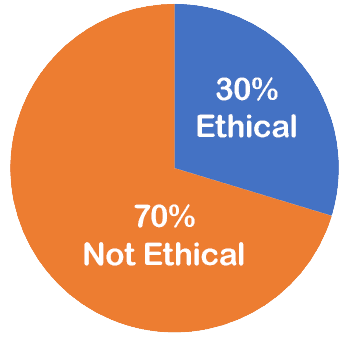This is the March 2023 edition of our monthly series of Ethics case studies titled What Do You Think? This series is comprised of case studies from NSPE archives, involving both real and hypothetical matters submitted by engineers, public officials and members of the public.
Your peers and the NSPE Board of Ethical Review have reviewed the facts of the case as shown below. And, here are the results.
Your opinion has been registered for the March 2023 edition of our monthly series of Ethics case studies titled What Do You Think?
Your vote is recorded as:

Want to know how your peers voted? We’ll send you an email with the poll results on March 28.
Your opinion has been registered for the March 2023 edition of our monthly series of Ethics case studies titled What Do You Think?
Your vote is recorded as:

Want to know how your peers voted? We’ll send you an email with the poll results on March 28.
A Review of the Facts
Engineer Russell offers a homeowner inspection service in which he performs an engineering inspection of residences by prospective purchasers. Following the inspection, Russell renders a written report to the prospective purchaser.
Russell performed this service for a client (husband and wife) for a fee and prepared a one-page written report, concluding that the residence under consideration was in generally good condition requiring no major repairs, but noting several minor items needing attention.
Russell submitted his report to the client, showing that a carbon copy was sent to the real estate firm handling the sale of the residence. The client objected that such action prejudiced their interests by lessening their bargaining position with the owners of the residence. They also complained that Russell acted unethically in submitting a copy of the report to any others who had not been a party to the agreement for the inspection services.
Did Russell act unethically in submitting a copy of the home inspection report to the real estate firm representing the owners?
Here is the result of our survey of your peers:

Applicable NSPE Code References:
Code II.1.c
Engineers shall not reveal facts, data, or information without the prior consent of the client or employer except as authorized or required by law or this Code.Code II.3
Engineers shall issue public statements only in an objective and truthful manner.Code II.3.a
Engineers shall be objective and truthful in professional reports, statements, or testimony. They shall include all relevant and pertinent information in such reports, statements, or testimony, which should bear the date indicating when it was current.Code II.4
Engineers shall act for each employer or client as faithful agents or trustees.
Discussion
At first glance, this appears to be a case involving a relatively small economic issue compared to the larger commercial and industrial projects with which engineers are often concerned. But as it involves an ethical principle we have not had occasion to address before, we will consider it on the broader philosophical aspects. Also, we note that this is not a case of an engineer allegedly violating the mandate of Code III.4 not to disclose confidential information concerning the business affairs of a client. That provision of the Code necessarily relates to confidential information given to the engineer by the client in the course of providing services to the client. Here, however, there was no transmission of confidential information by the client to the engineer.
Whether or not the client in this case actually suffered an economic disadvantage by the reduction of its bargaining power in negotiating the price of the residence through the owner having knowledge gained from the inspection report, the same principle should apply in any case where the engineer voluntarily provides a copy of a report commissioned by a client to a party with an actual or potential adverse interest.
It is a common concept among engineers that their role is to be open and aboveboard and to deal in a straightforward way with the facts of a situation. This basic philosophy is found to a substantial degree throughout the Code, e.g., Code II.3 and Code II.3.a. At the same time, Code II.1.c. recognizes the proprietary rights of clients to have the exclusive benefit of facts, data, and information obtained by the engineer on behalf of the client.
We read into this case an assumption that Russell acted without thought or consideration of any ulterior motive; that he, as a matter of course, considered it right and proper to make his findings known to all interested parties in order that the parties handle their negotiations for the property with both sides having the same factual data flowing from his services.
Thus, although we tend to exonerate Russell of substantial or deliberate wrongdoing, he was nevertheless incorrect in not recognizing the confidentiality of his relationship with the client. Even if the damage to the client, if any, was slight, the principle of the right of confidentiality on behalf of the client predominates.
The Ethical Review Board’s Conclusion

Russell acted unethically in submitting a copy of the home inspection to the real estate firm representing the owners.
BOARD OF ETHICAL REVIEW
Ernest C. James, P.E., Lawrence E. Jones, P.E., Robert H. Perrine, P.E., James L. Polk, P.E., J. Kent Roberts, P.E., Alfred H. Samborn, P.E., F. Wendell Beard, P.E., Chairman
Note – In regard to the question of application of the Code to corporations vis-a-vis real persons, business form or type should not negate nor influence conformance of individuals to the Code. The Code deals with professional services, which services must be performed by real persons. Real persons in turn establish and implement policies within business structures. The Code is clearly written to apply to the Engineer and it is incumbent on a member of NSPE to endeavor to live up to its provisions. This applies to all pertinent sections of the Code. This opinion is based on data submitted to the Board of Ethical Review and does not necessarily represent all of the pertinent facts when applied to a specific case. This opinion is for educational purposes only and should not be construed as expressing any opinion on the ethics of specific individuals. This opinion may be reprinted without further permission, provided that this statement is included before or after the text of the case.









Why not disclose the contents of the contract? Without that information, no real decision on ethics can be reasonably be made.
If Russell’s contract indicated that a copy would be provided to the real estate office would this action still be deemed to be unethical?
By law in most states, don’t inspection reports regarding the sale of real property have to be disclosed to both parties? I would think that fact would have some bearing on this finding.
Easy one! The report belongs to his client alone (caveat for imminent public safety not withstanding)
Interesting case. At least here in Ohio it is standard practice to submit the home inspection report to both the buyer and the owner. As matter of fact, both parties were present at the inspection. It was all clearly stated up front that everyone got a copy. I wonder if it is a state requirement in Ohio or just a commonly accepted practice.
I agree with the ruling in this case, since there is no other statements showing that such a sharing of information is required.
Good topic!
Engineer Russel’s action to send a copy of the inspection report to the seller’s agent was not ethical. The agent did not pay for the report and no prior arrangement to give the agent a copy of the report is noted in the case. So, on a pure ethics basis, this is a violation.
As a practical matter, if the prospective buyers (who presumably submitted an offer which led them to hire an inspector) want to use the report for leverage, they’re will have to share it with the sellers and their agent. Unless they want to falsify what the report documented or bluff that the report notes terrible conditions. In that case, the prospective buyers would be the ethical violators.
Engineer Russell’s actions in submitting his report to a third party not in his contract were Not Ethical. A circumstance where such a third party notification would be Ethical would be if Engineer Russell determined that the house in question was in imminent danger of structural collapse or some other type of life-threatening catastrophic failure. Under those circumstances, Engineer Russell should send a copy of his report to the local Building Code / Inspections authority (and follow up with a phone call), even though they are a third party not in the contract.
never cover the mistake even it was out of party. otherwise it would be as a silenced devil.
While I believe that the direct client of the engineer should have say in who sees a copy of their engineer’s report, my experience in the Chicagoland area has been that when my report is forwarded to the owners as “proof” that there are structural repairs needed, it helps them in negotiating a reduction in price if they are still interested in purchasing the home (or it simply allows them to cancel their contract). No house is perfect, and my first goal is to help the potential purchasers make “an informed decision”. Because I am not only a licensed engineer but also a licensed general contractor, I also can provide sound projections on potential repair costs, which also help in negotiations.
I’m not sold on this conclusion. Wouldn’t Russel have an obligation to share findings with property owner since he had to get their permission to enter the property to conduct the inspection. Furthermore, if any of his findings were potential safety concerns, and the buyer decided to not buy or even tell the owner of the findings, wouldn’t that then put Russel at risk for failing to advise of safety issues noted?
First of all, a one-page report seems very skimpy to me considering such an important decision must be made by the perspective buyer. In my home inspection service in the Hudson Valley in New York State for over 50 years I would never give a report copy to the real estate agent(or anyone else) unless I cleared it with my client(who paid for it) first. Especially since once it’s in the real estate agents hands, who knows what they will do with it. Agents are not the most ethical group! We all know that the report usually is used for negotiating, but then it would be the client’s(buyer’s) decision to give all or part of the report to the seller or any agent.
One might believe that Russell’s providing a copy to the real estate firm would be actually help the prospective purchases as they now have a document suitable for negotiation prepared that one might assume sealed by a Licensed Professional Engineer outlining issues, what ever they might be. This as I have experienced by utilizing a so called “Home Inspector” who basically has very few credentials resulting in comments from the sellers “Oh just another charlatan.” Come to think of it, I should have done the inspection!!
I would think that prior to the inspection, the Engineer would have explained to the client who would be the recipient(s) of the report. I believe the buyer is normally the party that pays for the inspection and presents the results to the seller as part of their justification of their offer. Regardless of who paid for the inspection, the results need to be known by both parties to make the report useful in the sale. I believe Russell did the ethical and practical thing.
The action to share the report with the seller’s agent without express permission may have been unethical prima facie. But the simple fact remains that his client had no actual bargaining power with the seller without disclosing the contents of the report that substantiates their claim that some aspect of the home required repair or reduced the sale price of the home. No seller, regardless of state statute would agree to any such term without seeing the report.
Based on the limited information provided in the case summary, it was hard to decide, but I chose “unethical” assuming the contract/agreement between he and his clients did not state that he would be sharing results with other parties. Absent that upfront declaration his findings should have stayed with his client and his client alone.
As noted by others, the buyers were the client who purchased the knowledge and expertise of the engineer for their use. As it appears there were no significant safety issues there was no need to inform all of the other parties. Obviously the buyers would have informed the sellers that their inspector found several issues that they would like addressed and presented the report to the sellers at that time (who presumably would have a few days to mull over said report before responding). Of course, if the buyers didn’t provide a copy of the report the sellers could simply say, “We’re not selling then.”
As an aside, what I found interesting is that the engineer provided a “carbon copy” to the real estate company. This implies that this case goes back more than a few years!